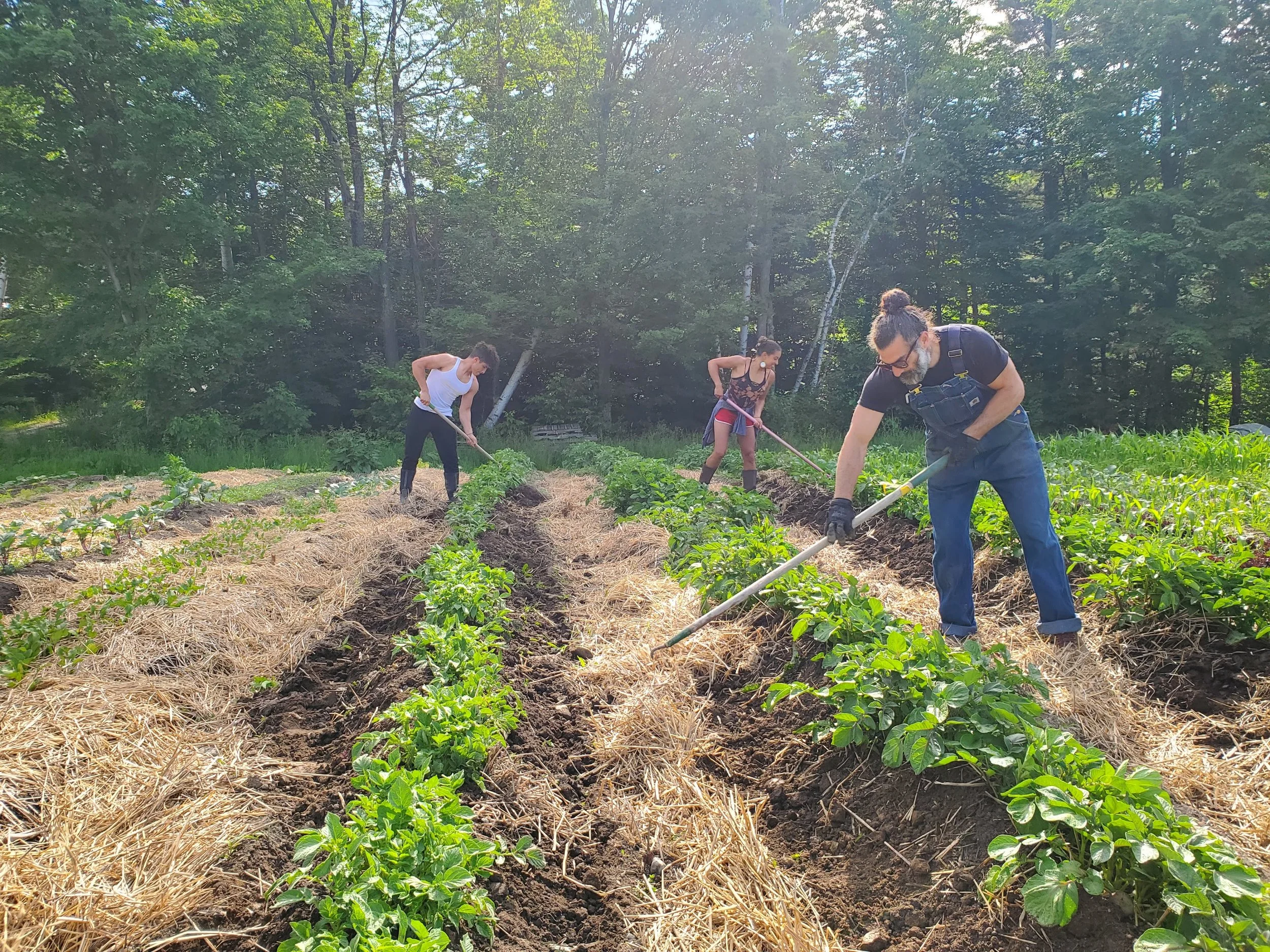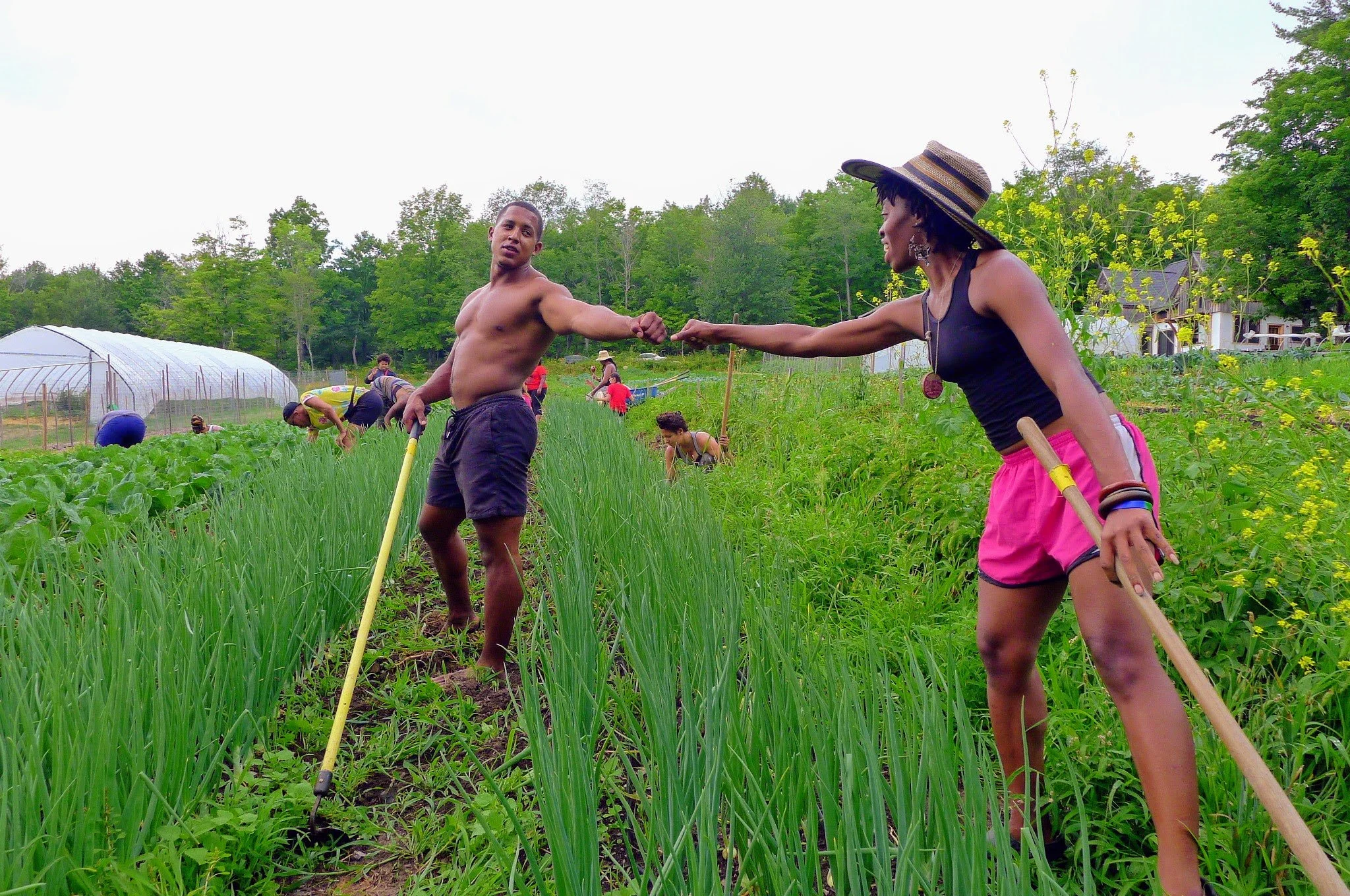Seeds and Sovereignty
An Interview with Leah Penniman
Editor’s Note: Leah Penniman is among the founders of Soul Fire Farm in eastern New York, and is the author of Farming While Black. Soul Fire Farm exemplifies the movement for greater farmland access featured in this issue. This interview is an excerpt from Ayana Elizabeth Johnson’s book, What If We Get It Right?, which was reviewed in issue #5 of From the Ground Up. – Brian Donahue
Ayana Elizabeth Johnson (AEJ): Overall, how does our food system work now, and how would it be different if we got it right for people and justice and the climate, from seed to table?
Leah Penniman (LP): Today the food system is fundamentally based on stolen land, exploited labor, and a profit motive. Farmworkers, arguably one of the most important professions in the world, are not protected under the Fair Labor Standards Act or the National Labor Relations Act. They don’t have a right to overtime pay, to a day off in seven, to collective bargaining, to protections against wage theft or child labor.
Since the beginning of the agricultural system in the U.S., which was based on chattel slavery, workers have always been exploited. There are the huge disparities in terms of land ownership and access, and ownership is rooted in a legacy of attempted genocide and land theft from Native people and expulsion of Black people from their land holdings starting in the early 1900s.
On the consumer side of things, we live in a system of food apartheid, where your ZIP code and the color of your skin can determine your life expectancy, your access to fresh food, your disproportionate burden of diet-related illnesses like kidney failure and heart disease. One in four children of color often go to bed hungry. The food system is not based on taking care of people or taking care of the Earth. It’s based on extracting a profit for the owners.
“The Earth has been crying for the footsteps of her children to come home. And when folks finally taste it, a little bit of it, a flood of remembering comes back.”
A re-envisioned food system, a democratic food system, would have the interests of all the members of our sacred community in mind. Land would be apportioned fairly and owned collectively. Workers would be treated fairly, with dignity, and have an ownership stake in their cooperative. Everyone would have access to culturally appropriate, life-giving, affordable foods that nourish and prepare us for civic life and contributing the best of our brilliance and capabilities. Everyone gets to eat. Regardless of the color of your skin or where you were born, you have enough calories and nutrients and vitamins and minerals. And the soils would be healthy—growing, not washing away. It’s got, in our region, at least 10% organic matter and a rich microbiome. The seed is a heritage seed that is not genetically modified, that is passing on the story of a people. The carbon would revert its trajectory and be headed back into the soils. And we would be continually innovating around the question of: How can we do better in serving human and beyond-human kin?
Photo courtesy of Soul Fire Farm
AEJ: Yes, please. I am into that future.
LP: My daughter, Neshima, when she was really little she said, The food system is everything it takes to get sunshine onto your plate.
AEJ: Ooh.
AEJ: … Let’s take a step back. You didn’t grow up farming, and you were formerly a high school biology and chemistry teacher. You’ve clearly become not just a farmer but a wisdom keeper, gathering wisdom from previous generations and being deliberate about passing that on. How did this become your work?
LP: … When I was old enough to get a job, my mom found a flier at church about work on a farm, and I thought, “Awesome, that’s an Earth thing to do.” So I got a job at the Food Project in Boston working with urban and peri-urban farms, growing food, and serving it in low-income farmers markets, and I totally fell in love.
What is cooler than planting a seed and watching it grow and getting to feed somebody? It made everything clear. Being a teenager is pretty complicated and confusing, but there was something elegantly simple and pure about cultivating a seed and feeding the community. There was the anchor I needed to make it through adolescence.
AEJ: And you eventually did get your own farm, with your family. Tell us about Soul Fire Farm.
LP: We are a community farm in upstate New York. There are about 15 of us on the team at this point. Half of us are working the land, the other half do our national advocacy work. It started in 2005 when our family moved to Albany, New York. We were living in the South End, a neighborhood under food apartheid with no supermarkets, farmers markets, or accessible community garden plots. My spouse Jonah and I were struggling to get fresh vegetables and fruits for our young children. And our neighbors were as well. So when they found out that Jonah and I both had farming backgrounds, it became a running joke. They’d tease us like, When are you gonna start a farm for us? When are you gonna bring food to us?
Long story short, we wedded ourselves to these 80 acres of degraded mountain land, about 30 minutes outside of Albany, and got to work building a home, repairing the soils, and in 2010 opened Soul Fire Farm with one program: a doorstep-delivery solidarity share that brought low- and no-cost food to our neighbors in the South End.
That remains our long-standing program. But over time we started a nonprofit and a co-op and educational programming, became a community farm, developed our advocacy work, all kinds of other things. But foundationally, the farm was started in order to feed folks who deserved good food but couldn’t afford it in Albany, New York…
Working and learning at Soul Fire Farm. Photo courtesy of Soul Fire Farm
AEJ: There you have it.
LP: Food is a liberatory tool. We’re not dependent on a system that’s designed to kill us or extract from us. We’re dependent on our own community labor, our own sweat, and this land that we have mutual regard for in order to feed ourselves. And that jazzes me up…
“We live in a system of food apartheid, where your ZIP code and the color of your skin can determine your life expectancy, your access to fresh food, your disproportionate burden of diet-related illnesses like kidney failure and heart disease.”
La Via Campesina, which is a peasant movement, the largest in the world made up of people who are closest to the Earth, came up with this concept of food sovereignty. It’s the idea that every person has the right to democratic participation in the food system at all levels. It’s a vision for care of the ecosystem as a family member. In a material sense, land is the source of food, the place where we build our shelters, where we gather, where we bury our dead, where we enjoy scenic beauty and healing from nature. But on a metaphysical level, there’s something even more going on. I’ve experienced this firsthand when people come out to Soul Fire Farm for our farmer training programs.
Photo courtesy of Soul Fire Farm
I’ve gotten proud of my soil chemistry workshops that I teach, and folks walk away understanding cation exchange capacity. But in their evaluations, people who visited Soul Fire Farm kept talking about healing from trauma, kept talking about being able to let go of addictions, leave toxic marriages and dead-end jobs, make different decisions.
And I might be going out on a limb a little bit here, but the land was the scene of the crime, right? It’s where all this really jacked-up stuff happened to people of color—chattel slavery, sharecropping. And so it makes sense that our ancestors got the hell outta Dodge and left the red clays of Georgia for the paved streets of Pittsburgh.
But there was something left behind more than intergenerational wealth or deeds. I will put forth that a bit of our souls, our culture, our spiritual understanding of self, our connection to higher power was left in those soils. And the ache of that gap has been eating away at us for generations. The Earth has been crying for the footsteps of her children to come home. And when folks finally taste it, a little bit of it, a flood of remembering comes back. I am somebody. I’m worth something. My life matters. I have choices. I have options. I belong here.
There is a deep yearning to belong to land as home without which I don’t think we are complete as people. Land is everything.
Leah Penniman (all pronouns) is a Black Kreyol farmer, mother, soil nerd, author, and food justice activist from Soul Fire Farm in Grafton, NY. She co-founded Soul Fire Farm in 2010 with the mission to end racism in the food system and reclaim our ancestral connection to land. Leah has been farming since 1996, holds an MA in science education and a BA in environmental science and international development from Clark University, and is a member of clergy in West African Indigenous Orisa tradition. Her books, Farming While Black: Soul Fire Farm’s Practical Guide to Liberation on the Land (2018) and Black Earth Wisdom: Soulful Conversations with Black Environmentalists (2023) are love songs for the land and her people.
Dr. Ayana Elizabeth Johnson is a marine biologist, policy expert, writer, and teacher working to help create the best possible climate future. She is co-founder of Urban Ocean Lab, a think tank for the future of coastal cities, and is the Roux Distinguished Scholar at Bowdoin College. She authored The New York Times bestseller What If We Get it Right? Visions of Climate Futures (2024). Ayana earned a BA from Harvard University in environmental science and public policy, and a PhD from Scripps Institution of Oceanography in marine biology. She is the proud daughter of a teacher/farmer and an architect/potter. Above all, Ayana is in love with climate solutions.



